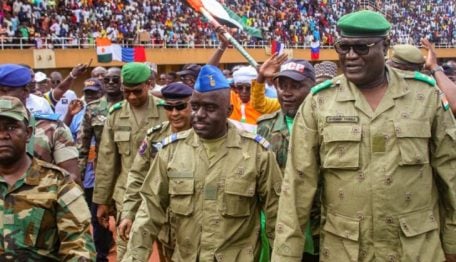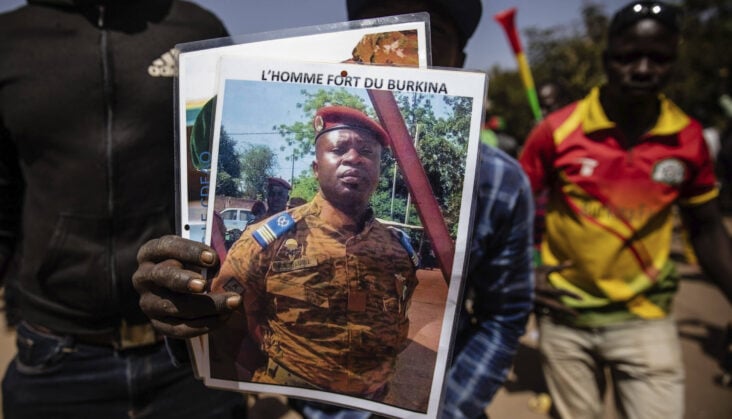Resurgence of military coups in Africa

![]()
Chris Uba
In the early hours of Wednesday, a group of senior military officer in Gabon announced on the national television station in the country that they had seized power and put President Ali Bongo under house arrest, stepping in minutes after the Central African state’s election body announced he had won a third term.
The soldiers highlighted serious institutional, political, economic and social crises as factors responsible for the coup that they tagged, ‘necessary’ for the progress of the West African oil producing nation.
In the address which was nationwide and rendered in French but translated to English by AFP, the junta said, “Our beautiful country, Gabon, has always been a haven of peace.
“Today, the country is going through a serious institutional, political, economic and social crisis.
“We are therefore forced to admit that the organisation of the general elections of August 26, 2023, did not meet the conditions for a transparent, credible and inclusive ballot so much hoped for by the people of Gabon.
“Added to this is irresponsible and unpredictable governance, resulting in a continuing deterioration in social cohesion, with the risk of leading the country into chaos.
“Today, 30 August 2023, we, the defence and security forces, gathered as the Committee for the Transition and Restoration of Institutions (CTRI) on behalf of the people of Gabon and as guarantors of the institutions’ protection — have decided to defend the peace by putting an end to the current regime.
“To this end, the general elections of 26 August 2023 and the truncated results are cancelled.
“The borders are closed until further notice.

The junta also dissolved all of the institutions of the country including the Federal Government, the Senate, the National Assembly, the Constitutional Court, the Economic, Social and Environmental Council and the Gabonese Elections Centre. They called for calm and serenity from the public, the communities of sister countries settled in Gabon, and the Gabonese diaspora.
“We reaffirm our commitment to respecting Gabon’s commitments to the national and international community.
“People of Gabon, we are finally on the road to happiness.
“May God and the spirits of our ancestors bless Gabon. Honour and loyalty to our homeland.”
Ali Bongo, 64, was re-elected for a third term, in an election the opposition described as a ‘fraud orchestrated’ by the ruling party. Bongo survived an attempted military takeover in January 2019 as he was recovering from a stroke. His family, one of Africa’s most powerful dynasties, has been in power since 1967.
The president has confirmed he is under house arrest and called for help, urging citizens to ‘make noise’.
There have been scenes of celebration in the Gabonese capital, Libreville since the military takeover.
French government spokesman Olivier Véran said France condemned the coup and restated its commitment to free and transparent elections.
But crowds that poured into the streets of the capital, Libreville, celebrated the news of the president’s removal, with several demonstrators saying they were glad the Bongo family was out of power.
Ali Bongo first took office in 2009 after the death of his father, Omar Bongo, who had ruled the oil-producing country for the previous 42 years.
Opponents say the family has failed to share the country’s oil and mining wealth with its 2.3 million people.

The declared coup comes on the heels of last month’s military overthrow of President Mohamed Bazoum of Niger, the latest in a series of coups across West and Central Africa since 2020. In short, it is the eight military coup in Africa in past three years.
There were two in Burkina Faso in 2022 as well as failed coup attempts in Guinea Bissau, The Gambia and the island nation of Sao Tome and Principe. In 2021, there were six coup attempts in Africa, four of them successful.
Following Samuel Huntington Third Wave of Democracy , African countries returned to competitive democracy in 1990s but the truth is that Africa has yet to embrace true democracy. Six decades after independence, most of these countries have yet to establish functioning democratic systems that deliver prosperity for their people.
In 2020, the Democracy Index classified only one country on the continent (Mauritius) as a full democracy. The rest were flawed, hybrid or authoritarian (nearly half) regimes. According to the African Report, Democracy and social progress have been hindered by endemic corruption, aggravated poverty, high levels of insecurity, and political instability — producing a vicious circle of heightened fragility and weakened state capacity.
According the African Report, the first is the spate of disenchantment by societies that is sweeping across the continent, directed at political leaders. The promise of democratic dividends has eluded most Africans as they find it difficult to reconcile their economic hardships with the extravagant lifestyles of the political class. Africans are worse off than they were 60 years ago.
Said African Report “Citizens’ agency, as we argued elsewhere, has thrived in recent times, as they begin to find their voices through renewed mass protests, demanding more transparency and accountability from the state.
These internal social grievances have given further impetus to long-held distrust by society towards the state. Recent events, owing to the harsh measures imposed by states in a bid to contain the spread of the Covid-19 pandemic, has further exacerbated the cracks along these social cleavages.
For instance, these harsh measures left the most vulnerable in dire need, following market closures, unavailability of access to adequate healthcare services, and in some instances, having to witness the hoarding of palliatives by politicians meant to ease the plight of the common citizen.
The reliance by some governments on Covid-19 measures, including emergency powers, to silence opposition protest movements only temporarily suspended mass actions that are manifesting themselves now as these restrictions are being removed.
Furthermore, insecurity has been an abiding challenge for most of the states that have encountered military takeovers or mutinies. These states have been unable to fully broadcast authority across their territories for at least a decade as they compete with insurgents for control over territories. In Chad, the state is being confronted with the challenge posed by violent extremist organisations including Boko Haram and its breakaway faction, the Islamic State in the West African Province (ISWAP).”
Both Mali and Burkina Faso have also found themselves struggling to contain the threat posed by the Islamic State and Al-Qaeda affiliated extremist groups. The unfortunate truth remains that these countries lack the capacity to mitigate these threats, thereby impeding their abilities to provide first for the security and safety of their people, and second basic and secondary services needed to attain prosperity.
Given that the end to these threats is not anywhere in sight, especially considering that their underlying socio-economic root causes remain prevalent and unaddressed, the situation on the ground should only be expected to deteriorate further.
“The second factor, which falls under the external, and which is expected to trigger more coups to come in parts of the continent, is the lack of strategic engagement with fragile states by the African Union (AU) and regional organisations. The usual approach has been to ‘condemn’, impose sanctions, and call for a return to ‘constitutional rule’ as the AU and ECOWAS did recently following the coups in Mali and Burkina Faso.
The problem with this reactionary approach is that it negates the primacy of proactive diplomacy, which is crucial to averting situations such as these, which also has the potential of leading ultimately to state collapse.
In this way, both the AU and ECOWAS have become ‘enablers’ by choosing to ignore the warning signs long before they fester in the form of democratic backsliding.”
Even though the AU launched the African Peer Review Mechanism (APRM) in 2003 which assesses governance performance and fragility and conflict-related issues in member states, the organisation has yet to establish mechanisms to ensure member states fully implement recommendations from peer review exercises — meant to strengthen their institutions of constitutional democracy and resolve political and social tensions.
African Report also cited the role of foreign powers in the problems militating against the continent. It identifies the role of foreign powers such as France, the US, and the EU. France’s Operation Barkhane and that of the EU’s in the Sahel aimed at stamping out violent extremists has not significantly shifted the war dynamic in favour of the host countries – nearly a decade later.
This has in part resulted in Mali’s decision to seek help from Russian mercenaries. Similarly, the shift in US grand strategy in the Sahel region from counterterrorism, to laying emphasis on states’ capacity building has fallen short of being successful, as evidenced by the recent spate of coups. These foreign powers are also guilty of fostering business as usual with autocratic regimes across the continent, thereby depicting a double standard that serves towards contributing to democratic backwardness in certain instances.
Given these realities, it should not be surprised at the news of additional military takeovers on the continent. As developments in Guinea Bissau showed early in February, soldiers in other countries are now likely to feel emboldened to ‘remake’ politics and ‘safeguard’ their countries.
Two more countries in West Africa, Benin and Côte d’Ivoire, are showing symptoms of the political breakdown and decay that ultimately led to these recent coups.
Both countries are currently under incumbent power-grabbing presidents, who are increasingly becoming unpopular domestically, yet continue to enjoy recognition and political legitimacy from ECOWAS, the AU and other foreign powers.
In the case of Benin, President Patrice Talon jailed or forced his main contenders to flee the country prior to the country’s last general elections. This forced the main opposition parties to boycott the election leaving Talon to face weak and little-known opponents – he subsequently ‘won’ a whopping majority of 86% of the vote.
Despite his efforts to derail his country’s democratic progress, both the AU and ECOWAS failed to act. Seven months after his re-election in April, President Talon was also hosted in France, by President Emmanuel Macron. These moves provided an external endorsement for Talon’s re-election, but locally they have created more resentment for foreign governments and regional organisations among the citizenry, as the latter continues to see the former as enablers.
Whether these will be done is subject to several things, not least the capacity and authority of these organisations themselves. In the meantime, Africa should brace up for the next round of coups in this new wave that may not be dissipating anytime soon.
Late Claude Ake , in one of his works stated that African leaders who were returning to democracy in the late 80’s did not actually believe in it. They did so because debt forgiveness from the western creditors. They needed to pretend that they loved democracy in order to curry the favour of the Bretton Wood institutions which had also become democracy enforcers. Besides, then the world had become a unipolar following the disintegration of the Soviet Union, making the U.S. and her allies in Europe to determine the global affairs.
But now, that the Vladimir Putin is trying to resuscitate bipolar world era or re-enacting the cold war era ,in alliance with China, it is very likely that emerging military government in Africa are going to run to them as exemplified by the activities of the Russian mercenaries, Wagner in the continent.


